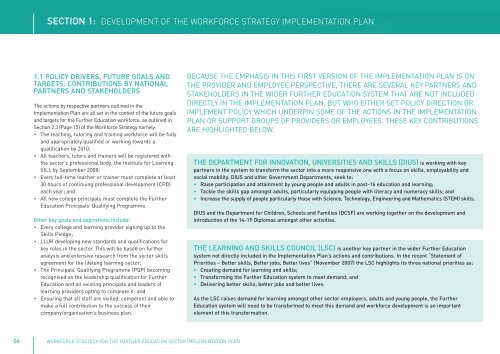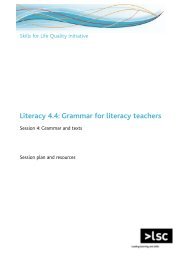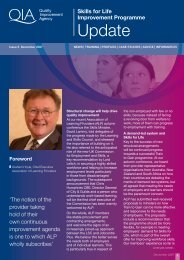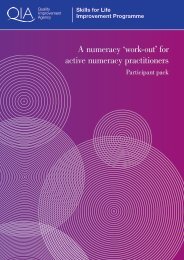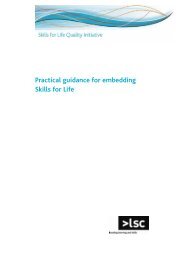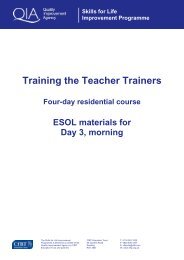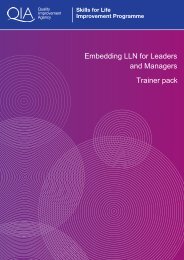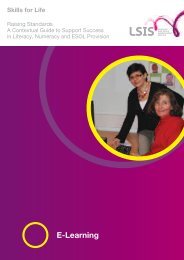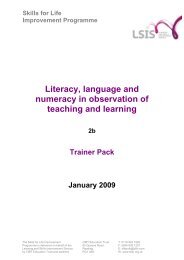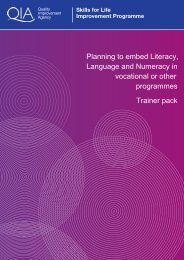IMPLEMENTATION PLAN - Skills for Life Improvement Programme ...
IMPLEMENTATION PLAN - Skills for Life Improvement Programme ...
IMPLEMENTATION PLAN - Skills for Life Improvement Programme ...
Create successful ePaper yourself
Turn your PDF publications into a flip-book with our unique Google optimized e-Paper software.
SECTION 1: DEVELOPMENT OF THE WORKFORCE STRATEGY <strong>IMPLEMENTATION</strong> <strong>PLAN</strong><br />
1.1 POLICY DRIVERS, FUTURE GOALS AND<br />
TARGETS: CONTRIBUTIONS BY NATIONAL<br />
PARTNERS AND STAKEHOLDERS<br />
The actions by respective partners outlined in the<br />
Implementation Plan are all set in the context of the future goals<br />
and targets <strong>for</strong> the Further Education work<strong>for</strong>ce, as outlined in<br />
Section 2.3 (Page 15) of the Work<strong>for</strong>ce Strategy namely:<br />
• The teaching, tutoring and training work<strong>for</strong>ce will be fully<br />
and appropriately qualified or working towards a<br />
qualification by 2010;<br />
• All teachers, tutors and trainers will be registered with<br />
the sector’s professional body, the Institute <strong>for</strong> Learning<br />
(IfL), by September 2008;<br />
• Every full-time teacher or trainer must complete at least<br />
30 hours of continuing professional development (CPD)<br />
each year; and<br />
• All new college principals must complete the Further<br />
Education Principals’ Qualifying <strong>Programme</strong>.<br />
Other key goals and aspirations include:<br />
• Every college and learning provider signing up to the<br />
<strong>Skills</strong> Pledge;<br />
• LLUK developing new standards and qualifications <strong>for</strong><br />
key roles in the sector. This will be based on further<br />
analysis and extensive research from the sector skills<br />
agreement <strong>for</strong> the lifelong learning sector;<br />
• The Principals’ Qualifying <strong>Programme</strong> (PQP) becoming<br />
recognised as the leadership qualification <strong>for</strong> Further<br />
Education and all existing principals and leaders of<br />
learning providers opting to complete it; and<br />
• Ensuring that all staff are skilled, competent and able to<br />
make a full contribution to the success of their<br />
company/organisation’s business plan.<br />
BECAUSE THE EMPHASIS IN THIS FIRST VERSION OF THE <strong>IMPLEMENTATION</strong> <strong>PLAN</strong> IS ON<br />
THE PROVIDER AND EMPLOYEE PERSPECTIVE, THERE ARE SEVERAL KEY PARTNERS AND<br />
STAKEHOLDERS IN THE WIDER FURTHER EDUCATION SYSTEM THAT ARE NOT INCLUDED<br />
DIRECTLY IN THE <strong>IMPLEMENTATION</strong> <strong>PLAN</strong>, BUT WHO EITHER SET POLICY DIRECTION OR<br />
IMPLEMENT POLICY WHICH UNDERPIN SOME OF THE ACTIONS IN THE <strong>IMPLEMENTATION</strong><br />
<strong>PLAN</strong> OR SUPPORT GROUPS OF PROVIDERS OR EMPLOYEES. THESE KEY CONTRIBUTIONS<br />
ARE HIGHLIGHTED BELOW.<br />
THE DEPARTMENT FOR INNOVATION, UNIVERSITIES AND SKILLS (DIUS) is working with key<br />
partners in the system to trans<strong>for</strong>m the sector into a more responsive one with a focus on skills, employability and<br />
social mobility. DIUS and other Government Departments, seek to:<br />
• Raise participation and attainment by young people and adults in post-16 education and learning;<br />
• Tackle the skills gap amongst adults, particularly equipping people with literacy and numeracy skills; and<br />
• Increase the supply of people particularly those with Science, Technology, Engineering and Mathematics (STEM) skills.<br />
DIUS and the Department <strong>for</strong> Children, Schools and Families (DCSF) are working together on the development and<br />
introduction of the 14-19 Diplomas amongst other activities.<br />
THE LEARNING AND SKILLS COUNCIL (LSC) is another key partner in the wider Further Education<br />
system not directly included in the Implementation Plan’s actions and contributions. In the recent “Statement of<br />
Priorities – Better skills, Better jobs, Better lives” (November 2007) the LSC highlights its three national priorities as:<br />
• Creating demand <strong>for</strong> learning and skills;<br />
• Trans<strong>for</strong>ming the Further Education system to meet demand; and<br />
• Delivering better skills, better jobs and better lives.<br />
As the LSC raises demand <strong>for</strong> learning amongst other sector employers, adults and young people, the Further<br />
Education system will need to be trans<strong>for</strong>med to meet this demand and work<strong>for</strong>ce development is an important<br />
element of this trans<strong>for</strong>mation.<br />
06 WORKFORCE STRATEGY FOR THE FURTHER EDUCATION SECTOR <strong>IMPLEMENTATION</strong> <strong>PLAN</strong>


